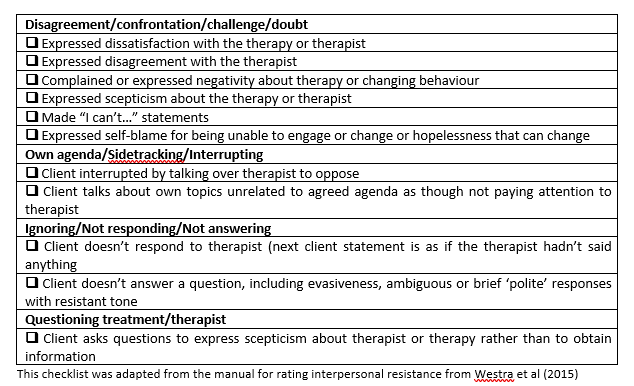Read my lips not my scores: Motivational statements that predict outcomes in GAD
Do you think you could reliably predict whether your client was motivated to change in their first session? Poulin and colleagues (2019) were able to.
They analysed data from a randomized controlled trial of cognitive behaviour therapy (CBT) with or without motivational interviewing (MI) for generalised anxiety disorder (GAD) (Westra et al., 2016). Both groups received 15 weekly individual sessions plus two booster-sessions. The CBT group only received CBT. The MI-CBT group received up to 4 sessions of MI in the first sessions (depending on how ambivalent they were), thereafter receiving CBT but delivered in the “spirit” of MI.
This research group has spearheaded the use of a particular observation-coding scheme that recognises a distinction between two types of client statements that superficially look like “resistance talk”. Clients might argue against change either because: a) they are ambivalent about change and are proffering their concerns about doing so; and/or b) opposing the suggestions of the therapist. The first type is Counter-Change-Talk-Ambivalence (CCT-A) and is thought to be a normal occurrence as people think through whether to and how to change. The second type is Counter-Change-Talk-Resistance (CCT-R) and represents a rupture in the alliance: the client no longer agrees with the therapist’s tasks and goals for session, and/or there is interpersonal discord (e.g., loss of trust, credibility, warmth etc). Although the amount of both kinds of counter-change talk was low in both therapy groups, CBT-MI recipients exhibited 3 times less CCT-R than those in the CBT only group. Higher levels of both CCT-A and CCT-R predicted worse outcomes (i.e., less reduction in worry), both immediately post-treatment and at one-year follow-up. This relationship was three times stronger for CCT-R talk than CCT-A talk. By contrast, neither the Change Questionnaire (CQ) or Client Motivation for Therapy Scale (CMOTS) scores correlated with worry outcomes or with observation-based ratings of client change talk. Perhaps what was most surprising about this study was that clients talking about not changing (CCT), which only occurred on average for 11% of the client’s talk time in session 1, predicted outcomes 12 months later! Client CCT in session one explained 38% variance in worry outcomes 12 months later.
Identifying client resistance
To give a concrete idea of what behaviours constitute CCT-R, here is a list adapted from the observational measure used for the study.
Take home: Clinical Implications
Psychotherapy 101: Therapists need to recognise resistance and stop being directive when they encounter it, instead clarifying and reflecting.
Good motivational interviewers recognise the difference between a client thinking aloud about problems they might encounter as they envision change, and a client arguing against the therapist because s/he feels controlled or criticised.
if therapists notice and are concerned about resistance among their clients, renewing and refreshing their motivational interviewing skills is highly recommended
Self-report measures of motivation to change are not particularly useful; observing the client’s actual statements in session and identifying arguments against change, and especially therapy or the therapist are far more important to attend to
Rather than simply attend a didactic workshop, therapists are encouraged to do some deliberate practice: record a session with a client and use an interview coding schedule to track the client’s pattern of change talk.
Go to https://www.tandfonline.com/doi/full/10.1080/16506073.2018.1517390 for the full article.
References
Poulin, L.E., Button, M.L., Westra, H.A., Constantino, M.J., & Antony, M.M. (2019). The predictive capacity of self-reported motivational language in cognitive behavioural therapy for generalized anxiety disorder. Cognitive Behaviour Therapy, 48, 369-384.
Westra, H. A., Constantino, M. J., & Antony, M. M. (2016). Integrating motivational interviewing with cognitive-behavioral therapy for severe generalized anxiety disorder: An allegiance controlled randomized clinical trial. Journal of Consulting and Clinical Psychology, 84, 768–782.

